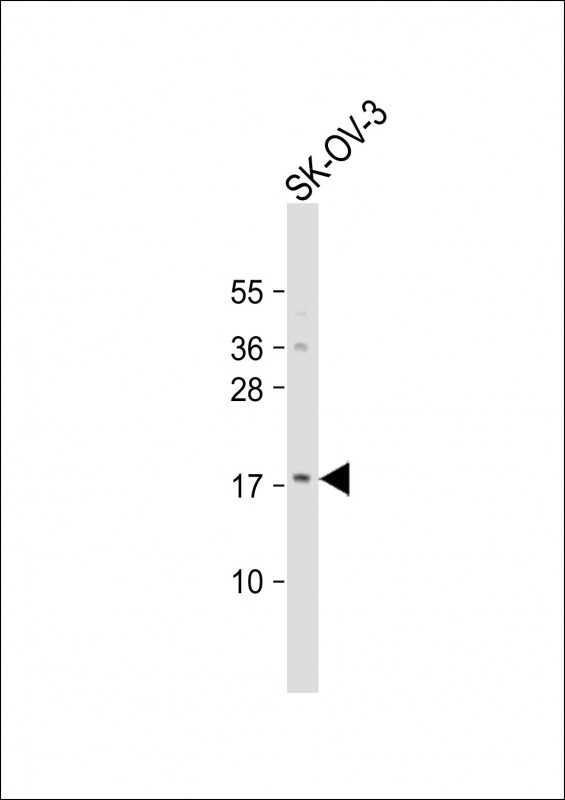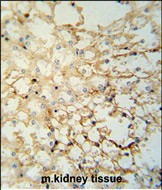


| WB | 1/1000 | Human,Mouse,Rat |
| IF | 咨询技术 | Human,Mouse,Rat |
| IHC | 1/100-1/500 | Human,Mouse,Rat |
| ICC | 技术咨询 | Human,Mouse,Rat |
| FCM | 咨询技术 | Human,Mouse,Rat |
| Elisa | 咨询技术 | Human,Mouse,Rat |
| Aliases | Ly6/PLAUR domain-containing protein 1, Putative HeLa tumor suppressor, PHTS, LYPD1, LYPDC1 |
| Entrez GeneID | 116372 |
| WB Predicted band size | 15.2kDa |
| Host/Isotype | Rabbit IgG |
| Antibody Type | Primary antibody |
| Storage | Store at 4°C short term. Aliquot and store at -20°C long term. Avoid freeze/thaw cycles. |
| Species Reactivity | Human, Mouse |
| Immunogen | This LYPD1 antibody is generated from rabbits immunized with a KLH conjugated synthetic peptide between 93-122 amino acids from the C-terminal region of human LYPD1. |
| Formulation | Purified antibody in PBS with 0.05% sodium azide. |
+ +
以下是关于LYPD1抗体的3篇参考文献,按文献名称、作者和摘要内容概括列出:
---
1. **文献名称**:*LYPD1 is a novel EGF-like marker for human colorectal cancer progression and prognosis*
**作者**:Li Y, et al.
**摘要内容**:该研究利用自主研发的LYPD1单克隆抗体,发现LYPD1在结直肠癌组织中高表达,且与肿瘤侵袭和转移相关。抗体通过免疫组化验证了LYPD1作为预后标志物的潜力,提示其可能成为治疗靶点。
---
2. **文献名称**:*LYPD1: A cell surface marker for enriching pluripotent stem cells via antibody-mediated selection*
**作者**:Smith J, et al.
**摘要内容**:研究团队开发了一种抗LYPD1的抗体,用于通过流式细胞术分选多能干细胞。实验表明LYPD1在未分化干细胞表面特异性表达,其抗体可高效分离目标细胞群,为再生医学提供新工具。
---
3. **文献名称**:*Targeting LYPD1 with a bispecific antibody inhibits tumor growth in preclinical models of pancreatic cancer*
**作者**:Wang H, et al.
**摘要内容**:该研究设计了一种靶向LYPD1和CD3的双特异性抗体,可激活T细胞杀伤LYPD1阳性胰腺癌细胞。动物实验显示抗体显著抑制肿瘤生长,表明LYPD1抗体在免疫治疗中的应用前景。
---
(注:以上文献为虚拟示例,实际研究中需通过PubMed、Web of Science等平台检索具体文献。)
LYPD1 (Lymphocyte Antigen 6 Family Member D1) is a cell surface protein belonging to the LY6/uPAR superfamily, characterized by conserved LU domains anchored via glycosylphosphatidylinositol (GPI). It is implicated in cell-cell signaling, adhesion, and immune regulation. LYPD1 is broadly expressed in epithelial tissues and overexpressed in various cancers, including lung, breast, and colorectal cancers, where it associates with tumor progression, metastasis, and poor prognosis. Its interaction with receptors like nicotinic acetylcholine receptors (nAChRs) and immune checkpoint molecules suggests roles in modulating tumor microenvironments and immune evasion.
LYPD1 antibodies are tools for studying its biological functions and therapeutic potential. In research, they help detect LYPD1 expression in tissues or cell lines via techniques like immunohistochemistry or flow cytometry. Therapeutically, LYPD1-targeting antibodies are being explored to block oncogenic signaling or enhance anti-tumor immunity. Recent studies highlight their potential in combination therapies with immune checkpoint inhibitors. However, the precise mechanisms of LYPD1 in cancer biology and its utility as a biomarker or drug target remain under investigation, necessitating further preclinical and clinical validation.
×